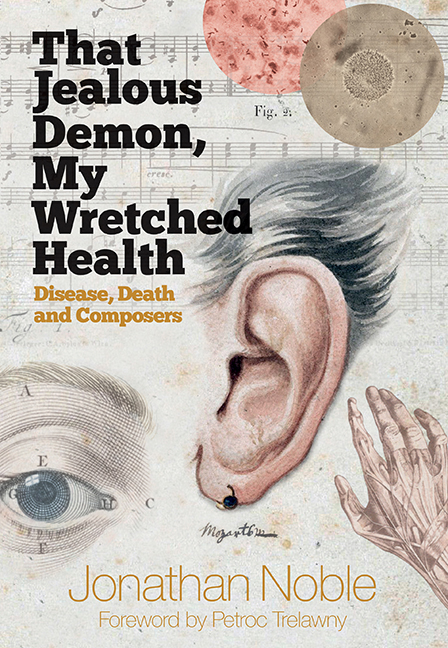Book contents
- Frontmatter
- Dedication
- Contents
- List of Illustrations
- Foreword
- Acknowledgements
- Medical Glossary
- Introduction
- 1 The Frailty of Youth
- 2 A Triumphant Old Age
- 3 Iatrogenic Afflictions
- 4 Syphilis
- 5 Alcoholism
- 6 Troubled Minds: Mental Illness and Suicide
- 7 Nerves Beyond the Edge: Other Afflictions of the Nervous System
- 8 Broken Hearts
- 9 Breathless: Respiratory Diseases
- 10 Cancer
- 11 The Ultimate Blow: Deafness
- Epilogue and Coda
- Appendix: Accidental and/or Violent Deaths
- References
- Bibliography
- Index
Appendix: Accidental and/or Violent Deaths
Published online by Cambridge University Press: 05 September 2018
- Frontmatter
- Dedication
- Contents
- List of Illustrations
- Foreword
- Acknowledgements
- Medical Glossary
- Introduction
- 1 The Frailty of Youth
- 2 A Triumphant Old Age
- 3 Iatrogenic Afflictions
- 4 Syphilis
- 5 Alcoholism
- 6 Troubled Minds: Mental Illness and Suicide
- 7 Nerves Beyond the Edge: Other Afflictions of the Nervous System
- 8 Broken Hearts
- 9 Breathless: Respiratory Diseases
- 10 Cancer
- 11 The Ultimate Blow: Deafness
- Epilogue and Coda
- Appendix: Accidental and/or Violent Deaths
- References
- Bibliography
- Index
Summary
These studies have revealed little connection between accidental or violent death and musical composition, although there are several caveats to that, and the ultimately fatal accident suffered by Jean-Baptiste Lully is often claimed to have altered or fostered the progress of orchestral conducting. Nevertheless, some surprising statistics emerge. This book covers seventy composers, albeit twenty-six of them briefly. However, an additional nine died violently or accidentally. If we add to them non-fatal injuries suffered by Mendelssohn, Puccini, Prokofiev and Ravel from traffic accidents, as well as Nielsen, then fourteen of a total group of seventy-nine suffered violent or accidental episodes (18%). These are surprisingly high figures, without an obvious explanation. Three died as a result of warfare, two are alleged to have ultimately developed sepsis secondary to boils, and two succumbed to freak accidents.
Jean-Baptiste Lully (1632–1687) famously was conducting his own Te Deum to give thanks for the Sun King's recovery from surgery. As he beat time, he drove his conducting staff's pointed end into his foot, which subsequently became infected. Gangrene followed; he refused an amputation and died two months after the original episode. The theory that, forewarned by this tragedy, conductors thereafter used a scroll, violin bow or ultimately a baton to conduct is exaggerated. By Lully's time the conducting staff was starting to decrease in popularity, although it was Weber, Berlioz, and Wagner, more than a century later, who brought the art of conducting to a picture recognisable today.
Charles Valentin Alkan (1813–1888) almost by tradition died because, whilst he was seeking his Talmud from a high shelf, the bookcase fell upon him. Alternatively, matters may have been more prosaic as the concierge at his flat found him prostrate on the kitchen floor under the hat stand. It has been sensibly argued that he collapsed on arriving home, grabbing the hat stand as he did so. Having been put to bed, he died there later the same day, most probably from a stroke or heart attack. Otherwise, he may have fainted and collapsed whilst preparing food in the kitchen. McCallum has added mystery to Alkan's story, suggesting he was schizophrenic.
- Type
- Chapter
- Information
- That Jealous Demon, My Wretched HealthDisease, Death and Composers, pp. 363 - 365Publisher: Boydell & BrewerPrint publication year: 2018



